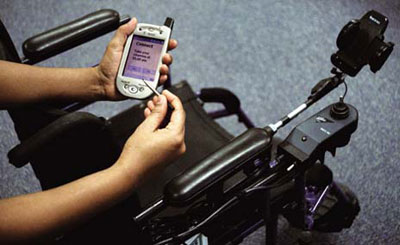| Prof analyzes presidential election | Randy Snow joins Olympic Hall | Distinguished alumni named |
 |
||
| Home Forethought Campus Buzz Feature Stories Re:Search The Score Alum News Yesteryear | ||
What began as a grant to a UTA research team might wind up being a lifesaver for hundreds of Texans with disabilities.
 |
| UTA researchers hope the personal portable device they've developed will one day be as commonplace as cellphones. The PPDs are currently being tested in Texas. |
Computer science and engineering Professor Farhad Kamangar is leading a project that combines computing, robotics, social work and communication technologies to help disabled people stay in touch. The result is the personal portable device, a handheld wireless contraption that can be tailored to accommodate the limitations that keep users from operating cellphones or personal digital assistants.
If the user is blind, the PPD will speak or beep loudly. If he�s deaf, it can read printed words. A foot pedal can operate the device if the user is paralyzed above the waist.
�The overall concept is basically to provide information access to people with disabilities,� said Manfred Huber, a CSE assistant professor working on the project. �What are the things that would be useful to that group? Around that we developed this concept of uniform software structure and set of services.�
A $2.2 million Texas Health and Human Services Commission grant funds the research, which began two years ago in collaboration with the Dallas-based Center for Computer Assistance to the Disabled and SensorLogic, a machine-to-machine communications company in Richardson.
Clients at C-CAD and similar centers in North and East Texas are testing the first few PPDs. Once their feedback is received, 600 revamped devices will be released to individuals in a test-market, 12-county rural region of East Texas where satellite and other communications tools may be lacking. Dr. Kamangar calls the project �in its Beta phase.�
�Right now, we�re testing the device,� he said. �The timetable was basically 20 to 40 [PPDs in circulation] by the end of the summer. Then in January or February, there will be 300 to 400. � The program is changing per week. It�s not a finalized device, but it�s usable right now.�
Kamangar and his team hope the PPDs will eventually become as obtainable as cellphones. The devices will cost about $850, but the software will be free.
PPDs rely on existing communications infrastructures but operate through their own system of Web servers and databases. They allow current users to respond �yes� or �no� but will eventually become two-way devices, similar to computer instant messaging programs.
They could be used for health care monitoring, for example, and a health care worker could send messages to a PPD via the Internet. A nurse could remind a patient to take medication or let him know an appointment has been canceled. The message would be delivered in different ways, depending on the user�s schedule. If someone is asleep, then the message would sound after he wakes up.
PPDs promise fun, too.
Kamangar said the team will program future devices to provide news, entertainment, chat capabilities, job fairs, even bus schedules. Smarter hardware will adjust the volume in a noisy environment or detect if the user falls.
�We can use that for calling someone automatically,� he said. �We plan to make it a little smarter. We�re in the process of building our own environmentally intelligent device.�
And the UTA researchers are doing some communicating of their own.
Dr. Huber said the team is talking to �a number of companies, including most of the cellphone providers,� to see if they�ll make the PPD service widely available. The developers are optimistic; though limited, the feedback has been positive.
�I think they really like the idea,� Huber said. �The latest version that they tested, they were pretty satisfied. Basically, we�re at the point where they�re happy enough that they think it�s the right point in time to start distributing. It�s good enough for them to use. � Now let�s see where it goes.�
— Danny Woodward
| Archives
| Alumni Association |
Giving to UTA | UTA
Home Copyright © 2004 UTA Magazine. All rights reserved. |